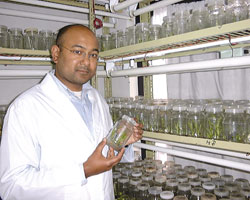 In high school, I thought my classmate Brajesh Nanda Vaidya would someday be an artist, not the self-made biotech entrepreneur that he is today. After completing higher education in the US, he returned home in the 1990s. Putting his science background to use, he started managing Nepal Biotech Nursery, a 17-person firm that produces tissue-cultured high-yield banana and orchid plantlets, which farmers snap up. I recently caught up with Brajesh in Kathmandu, and found out that his business experience is similar to that of many small-business owners.
In high school, I thought my classmate Brajesh Nanda Vaidya would someday be an artist, not the self-made biotech entrepreneur that he is today. After completing higher education in the US, he returned home in the 1990s. Putting his science background to use, he started managing Nepal Biotech Nursery, a 17-person firm that produces tissue-cultured high-yield banana and orchid plantlets, which farmers snap up. I recently caught up with Brajesh in Kathmandu, and found out that his business experience is similar to that of many small-business owners.
The beginnings were tough, he said. "I was naive, fresh from the US, and didn't understand the Nepali system of doing business. I tried to do it the way I had learnt it in the US: hire the right people, give the right assignments, watch for results, that sort of thing. None of that worked. I learnt the hard way that most people just wanted to take me for a ride. Without bothering to help me run my business, almost everyone, from government bureaucrats to business partners and associates, to workers, just wanted a piece of the pie I was struggling to create. It was both bewildering and frustrating."
It was also difficult to develop an appropriate trust-based long-term support structure, he added. "Often, my own business associates and others would take advantage of my ignorance. They'd say and do things to discourage me so I wouldn't be successful. The level of mistrust and pessimism that pervades most business interactions and the amount of bad-mouthing that goes on is depressingly high. Psychologically, you really have to remain very, very strong to stick to business in Nepal."
Surely that was not the case in the villages of the hills and the tarai, where he regularly travels to meet farmers and see how their plants are doing? Brajesh said people have changed in the rural areas. "Everyone wants to make quick money.
Village youth dream of one thing-to go abroad and make money as labourers. There is an acute shortage of people between the ages of 20 and 35 who can actually do the farming. And when overseas labourers return with a few lakhs in savings, they quickly spend it on constructing cement houses. They don't really seem interested in farm work."
So what keeps him going? Three things, Brajesh said. "Nepal's small size is a blessing. If you do good work, it gets noticed quickly. People in agribusiness know me well. When small farmers in Jhapa or Kanchanpur tell me they now earn more from selling more bananas, orchids, and flowers, I feel I'm doing something for the country. Nepal can take huge leaps and farmers' incomes can grow considerably with the introduction of high-yielding plantlets and better farming methods. We can't allow that potential to go to waste. That kind of hope keeps me going."
But such hope can be lost amidst today's superheated rhetoric about \'New Nepal\'. Thoughtful discussion is missing about what to do about our number one problem-jobs for thousands. Unless we find ways to translate abstract principles of democracy into creating concrete jobs for young people by making it easier for thousands of Brajeshes to run businesses in various sectors, the day will not be far when those in the gap between democracy's promise and what it actually delivers reveal their discontent.



